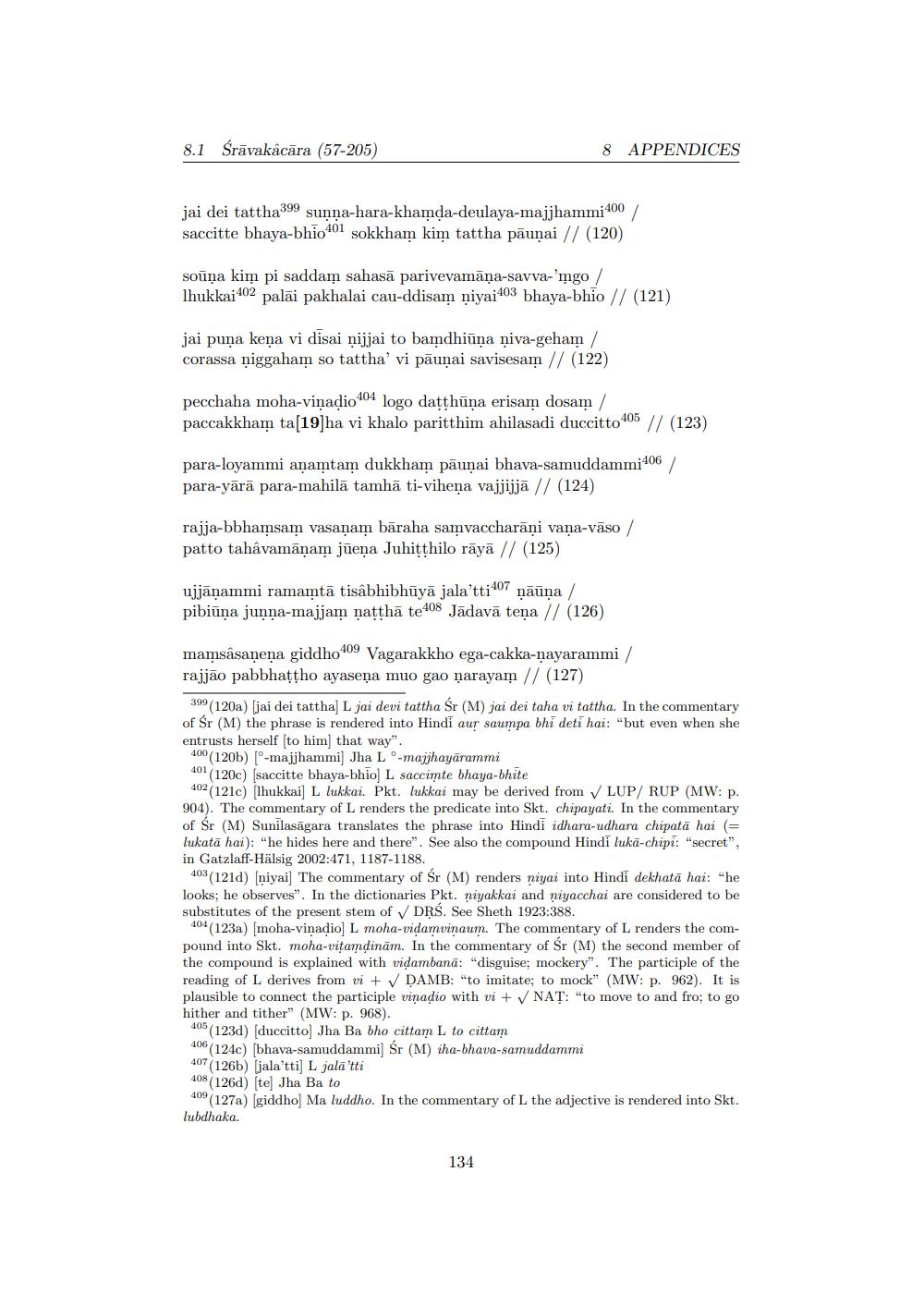________________
8.1 Srāvakácāra (57-205)
8 APPENDICES
jai dei tattha399 sunna-hara-khamda-deulaya-majjhammi 400 / saccitte bhaya-bhio 401 sokkham kim tattha pāunai // (120)
soūņa kim pi saddam sahasā parivevamāņa-savva-'mgo / lhukkai 402 palāi pakhalai cau-ddisam niyai 403 bhaya-bhio // (121)
jai puna keņa vi disai nijjai to bamdhiūņa niva-geham / corassa niggaham so tattha' vi pāunai savisesam // (122)
pecchaha moha-viņadio404 logo datthūņa erisam dosam / paccakkham ta[19] ha vi khalo paritthim ahilasadi duccitto 405 // (123)
para-loyammi anamtam dukkham pāunai bhava-samuddammi 406 / para-yārā para-mahilā tamhā ti-vihena vajjijjā // (124)
rajja-bbhamsam vasaņam bāraha samvaccharāni vana-vāso / patto tahavamānam jūena Juhitthilo rāyā // (125)
ujjāņammi ramamtā tisâbhibhūyā jala'tti 407 ņāūņa / pibiūņa junna-majjam natthā te408 Jādavā teņa // (126)
mamsâsaņeņa giddho 409 Vagarakkho ega-cakka-nayarammi / rajjão pabbhattho ayaseņa muo gao narayam // (127)
399 (120a) jai dei tattha) L jai devi tattha Śr (M) jai dei taha vi tattha. In the commentary of Sr (M) the phrase is rendered into Hindi aur saumpa bhi deti hai: "but even when she entrusts herself to him that way". 400 (1206) [-majjhammi) Jha L -majjhayārammi 401(120c) (saccitte bhaya-bhio L saccimte bhaya-bhite 402 (121c) lhukkai] L lukkai. Pkt. lukkai may be derived from LUP/ RUP (MW: p. 904). The commentary of L renders the predicate into Skt. chipayati. In the commentary of Sr (M) Sunilasāgara translates the phrase into Hindi idhara-udhara chipată hai (= lukatā hai): "he hides here and there". See also the compound Hindi lukā-chipi: "secret", in Gatzlaff-Hälsig 2002:471, 1187-1188.
403 (121d) niyai) The commentary of Sr (M) renders niyai into Hindi dekhata hai: "he looks; he observes". In the dictionaries Pkt. niyakkai and niyacchai are considered to be substitutes of the present stem of DRS. See Sheth 1923:388.
404 (123a) moha-vinadio L moha-vidamvinaum. The commentary of L renders the compound into Skt. moha-vitamdinām. In the commentary of Śr (M) the second member of the compound is explained with vidambanā: "disguise; mockery". The participle of the reading of L derives from vi + DAMB: "to imitate; to mock" (MW: p. 962). It is plausible to connect the participle vinadio with vi + NAT: "to move to and fro; to go hither and tither" (MW: p. 968). 105 (123d) (duccitto Jha Ba bho cittam L to cittam 406 (124c) [bhava-samuddammi) Śr (M) iha-bhava-samuddammi 407 (126b) jala'tti] L jalatti 408 (126d) te Jha Ba to 409 (127a) giddhoMa luddho. In the commentary of L the adjective is rendered into Skt. lubdhaka.
134




